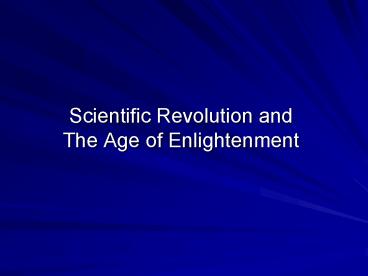Scientific Revolution and The Age of Enlightenment - PowerPoint PPT Presentation
1 / 15
Title:
Scientific Revolution and The Age of Enlightenment
Description:
Title: PowerPoint Presentation Author: High School Last modified by: agreen Created Date: 2/4/2001 8:55:26 PM Document presentation format: On-screen Show (4:3) – PowerPoint PPT presentation
Number of Views:81
Avg rating:3.0/5.0
Title: Scientific Revolution and The Age of Enlightenment
1
Scientific Revolution and The Age of
Enlightenment
2
- Also known as The Age of Reason
- Sci. Rev. new way of examining the world
logically (scientific method, etc.) Began in
1600s. - Paved way for Enlightenment.
- Height mid-1700s
3
Key Ideas
- Enlightenment philosophers admire scientists use
of reason to understand the natural world. - Promote reason to understand government,
religion, education, and economics. - Advocate government reform and social improvement.
4
Enlightened Philosophers
5
Thomas Hobbes
- Believed people always acted in their own self
interest - Government needed to keep order
- Life w/o govt solitary, poor, brutish, short.
6
John Locke
- Thought people were reasonable had natural
ability to govern themselves - Purpose of government protect natural rights of
life, liberty, and property
7
Voltaire
- Tolerance, reason, and freedom of thought,
expression, and religious belief
8
Montesquieu
- Idea of Separation of Powers (3 branches of
government) checks and balances to keep any
individual or group from gaining complete control
of the government
9
Rousseau
- Viewed government as a Social Contract among free
individuals to create a society guided by the
general will
10
Mary Wollstonecraft
- Argued for womens education and political
participation - Believed women, like men, need education to
become virtuous and useful
11
How did Enlightenment writers and thinkers set
the stage for revolutionary movements?
- Encouraged people
- to judge for themselves what was right or wrong
in society - Rely on human reason to solve social problems
12
Major Ideas of the Enlightenment
- Natural Rights life, liberty, property Locke
- Freedom of Thought and Expression Voltaire
- Religious Freedom Voltaire
- Separation of Powers Montesquieu
- Rebellion against corrupt Govt is okay
Rousseau - Womens Equality Wollstonecraft
13
Questions
- Voltaire is credited with saying I disapprove
of what you say, but I will defend to the death
your right to say it. What does this statement
indicate about Voltaires views on free speech?
How is it similar to beliefs about free speech in
the U.S.?
14
Whose ideas are most like your own? Why?
- Locke
- People are reasonable and able to make decisions.
- People should be able to rule themselves.
- Hobbes
- People are selfish, self-serving, and brutal.
- Without control, society would be chaotic
15
The End































